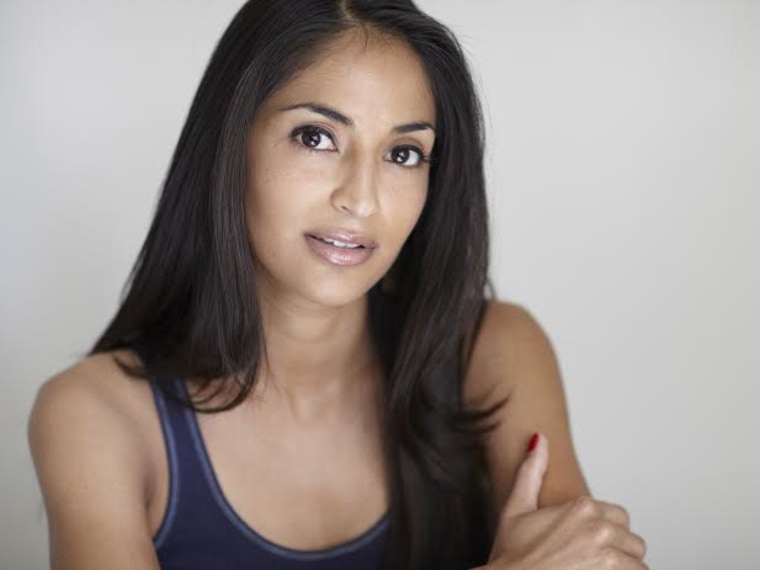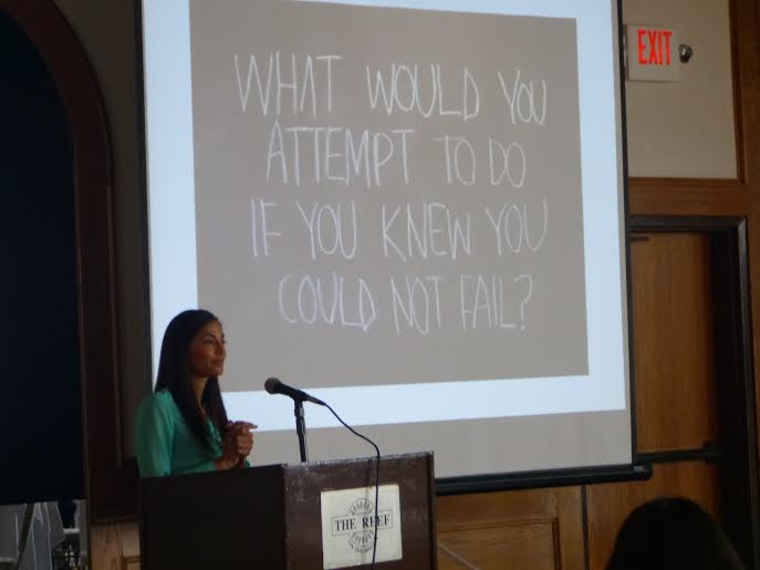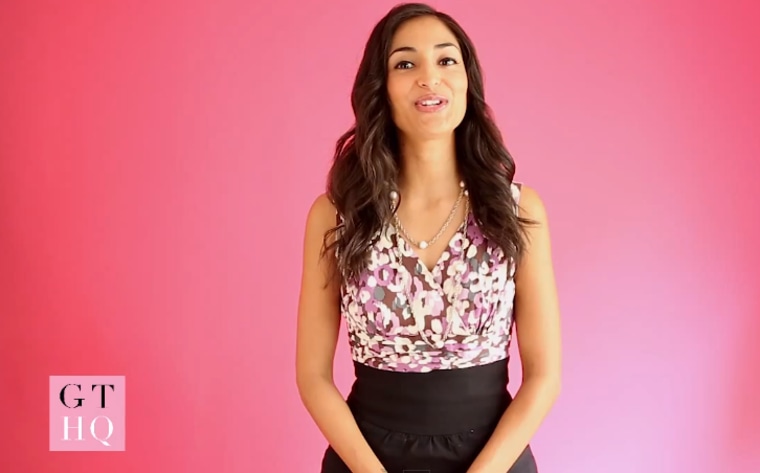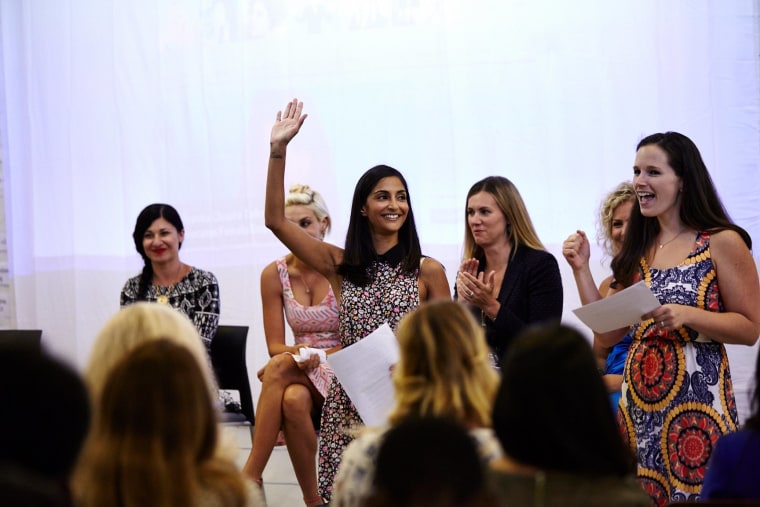After going through a divorce in 2012 and having second thoughts about her career, Asha Dahya looked to the women in her life for strength.
During her transition, Dahya felt most at ease when she read uplifting stories of everyday women redefining the definition of beauty, launching tech festivals, and speaking out against body shaming, bullying, and teen dating violence. But these stories, says Dahya, were often hidden among a pile of “train wreck” and click-bait articles that seemed to dominate the 24/7 news cycle.
“It fascinated me that there were some really cool stories out there, but that weren't getting enough headlines like the Paris Hiltons or Kim Kardashians,” Dahya said. It wasn't until the events of her life led her to find solace in those less-prominent stories, that Dahya would discover her own path.

31-year-old Dahya, a first generation Indian American, was born and raised in England. She grew up in a Christian household, and moved to Australia at the age of eight. Her parents were born and raised in East Africa before migrating to England and moving to Australia.
Dahya - who always sought out a career in television - felt like the black sheep of the family. Her father was an engineer, her mother was a teacher. Her sister is a nurse, and her brother is pursuing a Ph.D.
“My family always were supportive of everything that my brother and sister and I did. A lot of Indian parents are pushing their kids to get certain types of jobs," said Dahya. "My parents weren’t like that at all -- they just wanted us to be good people, live good lives, and still have jobs.”
Dahya's mother went from raising her children full-time to pursuing a career in teaching later in life. By the time Dahya and her siblings finished high school and college, her mother, then in her mid-50's, was attending a university in Australia, studying for her master's degree.
“She was a role model for me as a woman," said Dahya, "who didn’t necessarily have opportunities because of culture and tradition, and the culture she grew up in.”

Dahya followed in her mother's footsteps, pursuing her dreams of working in television with full force.
But after a decade in the entertainment and media industry as a TV host for networks like Disney Channel Australia, MTV Australia, and Fox8 Australia, Dahya felt she'd hit a ceiling. Disappointed with the lack of South Asian women, and women in color in general, on TV in Australia, she decided to move to America in 2008.
"You won't find women that look like me on any of their mainstream morning shows, nightly news shows or prime time TV shows,” said Dahya.
Landing in Los Angeles, Dahya hustled her way through the media pipeline, getting by through various web hosting and production jobs. She pitched an idea for a women’s talk show, but was turned down after an agent told her she would have to be a celebrity to host the show.
Dahya soon hit another dead end, and began questioning her path. An uncertain career in TV hosting was followed by a divorce from her husband of three years. Dahya had to shift gears, and change paths, fast.
"GirlTalkHQ needed to be a platform to share stories of everyday women that are going through real circumstances, but that can help other women feel less alone.”
She bid adieu to the red carpet galas, the slew of celebrity and entertainment auditions, and the pop culture life with which she was already growing increasingly disillusioned. Dahya turned to the same sorts of stories from which she drew strength - positive stories about other women doing remarkable things.
What began as a Tumblr page, aggregating and sharing those stories, quickly gained an impressive following. In 2012, Dahya took her project one step further by transforming it into GirlTalkHQ, a daily news site empowering millennial women. Operating as a one-woman-operation in her Los Angeles home, Dahya set out to build the go-to news site providing meaningful, inspirational content, without having to click through multiple sites or unrelated stories.
Overwhelmed by the support and readership, Dahya’s personal and career paths soon became a parallel track journey.
“Everything that I had been through as an Indian, as an Australian, as a TV host, was all because I was meant to launch this blog,” Dahya said. “Going through that divorce and seeing the lack of positive media stuff for women, I decided that GirlTalkHQ needed to be a platform to share stories of everyday women that are going through real circumstances, but that can help other women feel less alone.”

Since its 2012 launch, GirlTalkHQ has reached an audience in Australia, the UK, Canada, India, and the U.S., attracting readers between the ages of 25-40 and beyond. Dahya says that while most of the readers are women, approximately 40 percent of her readers are men.
Every month, the site averages about 58,600 unique visitors and 114,200 pageviews, according to the site’s statistics. GirlTalkHQ has also appeared on BBC News Trending Website, and RT News, and has partnered with brands like Verizon and Coca-Cola on campaigns.
Dahya believes GirlTalkHQ stands out from other media sites through its mission to share positive stories that may not necessarily drive clicks, but will elicit some sort of deeper and meaningful conversation from millennials and readers.
She gravitates toward positive news to help inspire change and empower readers to add to the conversation.
“I don’t like to talk about the tragedy that happens in the world or awful things and not in the sense to ignore that, but I purposely want every story to have a redeeming quality," said Dahya. “Even if it may be a tough topic, there is some sort of ray of light. We can take action, can raise our voice.”

Dahya most recently collaborated with Dear Kate, an undergarments company that launched a campaign to dispel the stigma attached to menstruation. The video campaign asked girls to share their thoughts on what it was like getting their period for the first time.
“I shared Dear Kate’s video and tied it into what Rupi Kaur in her photo series is doing," said Dahya, "and made it about how women and brands are empowering women not to feel dirty about their periods.”
GirlTalkHQ produces content reflecting topics important to the mainstream – topics like female empowerment, body image, discrimination in the workplace, and the wage gap. To complement daily web articles on the site, Dahya has also launched weekly Vlogs that cover trending topics, whether that’s discussing Nasty Gal CEO Amoruso’s take on what it means to be a “Girl Boss,” or conversations about the prevalence of domestic violence.
Dahya says she’d like to see more of women’s narratives and voices on the Internet, rather than reactionary pieces that group or stereotype women into one category.
“We’re reacting to issues of street harassment, we’re reacting to issues of rape in India. I feel like there needs to be more of women’s narratives – not just reaction to situations, " said Dahya. "If more women are telling stories and talking about a topic or situation from a female perspective, I think it would set a different standard.”
In particular, Dahya believes creating a space for Asian-American women to broach traditionally-taboo topics is important.
“There’s this idea that you don’t speak about sex, relationships, or divorce, or things like that in public. You keep this modest face in public and you’re very protective," she said. "That’s just not always realistic.”

GirlTalkHQ recently featured Muslim feminist blogger Amani al-Khatahtbeh of MuslimGirl.net, to highlight the rise of millennial bloggers working to challenge media stereotypes. Dahya says Muslim women, in particular, suffer from a one-dimensional portrayal in many outlets.
“Whenever people talk about Saudi Arabia, ‘oh, women can’t drive, they can’t be seen without a man’ which is true," said Dahya. "But at the same time, there are tech festivals in Palestine being held for women and all these amazing female entrepreneurs who are putting on these events, encouraging them to start businesses.”
The website and digital forum have now inspired in-person events. Dahya co-organizes quarterly "F Word" events, mirrored after Ted Talks, giving a group of women in each session the chance to share their own stories on topics ranging from careers and entrepreneurship to body image and social taboos. The next FWordEvent will be held May 21st in Los Angeles, featuring guest speaker Bri Seeley, founder of “The Inspirational Woman Project," and Hasna Masnavi, founder and president of the Women's Mosque of America.
Despite her success, and her new home in a city as diverse as Los Angeles, Dahya says she stills has moments when she feels like an outsider. Those moments, she says, only further fuel her to make sure GirlTalkHQ succeeds in giving women a space to share their own stories, and create their own narratives.
“I think part of what GirlTalkHQ is doing is giving a voice to women who have felt just like me," said Dahya. "In feminism and in women’s rights, all different types of women need to share their narratives – not just one.”
Like NBC Asian America on Facebook and follow us on Twitter.
